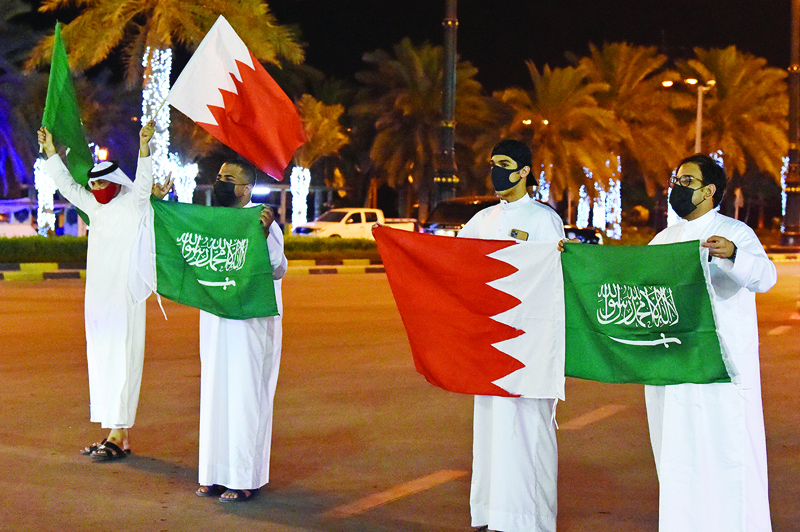 Bahrain men welcome Saudi travelers with Saudi and Bahraini flags on King Fahad Causeway yesterday. - AFP
Bahrain men welcome Saudi travelers with Saudi and Bahraini flags on King Fahad Causeway yesterday. - AFPAL JASRAH, Bahrain: Hundreds of cars crowded roads linking Saudi Arabia and Bahrain yesterday, as Riyadh permitted citizens vaccinated against COVID-19 to travel abroad more than a year after barring external trips. The King Fahd Causeway, a 25 km series of bridges closed in March last year, was packed with traffic as Saudi Arabia reopened its land, sea and air borders.
The easing of rules prompted a rush of holidaymakers to exit the kingdom, following the holiday of Eid Al-Fitr. "It's a beautiful feeling after such a long absence from Bahrain," said Mohammed, a Saudi travelling to the island nation. The opening of borders will give a welcome boost to Bahrain's tourism industry, which is heavily reliant on high-rollers from its conservative neighbor, the Arab world's biggest economy.
For decades, the causeway linking Bahrain to Saudi Arabia has served as a key artery, bringing visitors who pack out Bahrain's nightclubs, shopping malls and hotels. But since coronavirus slammed on the brakes, traffic was reduced to a trickle. Travelers also flocked to Saudi Arabia's airports yesterday for flights abroad.
"We have been confined within Saudi for around a year and a half, so we can hardly believe the ban is lifted and we can see the world," said Nawaf Al-Askar, a Saudi heading from Riyadh to Bosnia and Herzegovina with his family. Other travelers were leaving to resume their studies abroad or for long-delayed business trips. "We have been dreaming (of travelling) for more than a year... Thank God the airport is open and we can run away," said Riyadh resident Saleh.
Bahrain tourism officials were jubilant at the reopening of the causeway, after the long closure which reportedly cost its economy more than $10 million a day. The tourism sector was hit just as the pandemic triggered a decline in the oil price, in a double whammy for the smallest of the six Gulf Cooperation Council economies which has had to be bailed out by its neighbors in the past.
"It's a very symbolic occasion, representing the fact that we are... emerging hopefully out of COVID into a stage of normalcy," said Nasser Ali Qaedi, chief executive of Bahrain Tourism and Exhibition Authority (BTEA). Bahrain's economy will see a $2.9 billion boost following the lifting of Saudi restrictions, Al-Arabiya television reported, citing the Bahrain Economists Society.
"Everybody is asking - when are we going to return to pre-COVID levels, and no one can give an answer with a great deal of certainty on that," Qaedi told AFP. "It's unlikely to happen this year, however we're looking to see how much we can progress. We're anticipating a strong comeback globally, as COVID restrictions starts to ease and people start to find mechanisms to best handle the pandemic."
The enforced pause has given Bahrain an opportunity to develop its tourism industry - beyond its role as Saudi Arabia's playground - by drawing on a 5,000-year history. The relaxing of the travel rules in Saudi Arabia represents an incentive for citizens - barred from travelling abroad since the pandemic began - to get vaccinated.
Three categories of citizens are permitted to travel: Those who have received two doses of the vaccine, those administered a single dose at least 14 days prior to travel, and people who have recovered from infection within the last six months. Unvaccinated children can also travel provided they have an approved insurance policy.
Saudi's health ministry said it has administered more than 11 million coronavirus vaccine doses, in a country with a population of over 34 million. The kingdom has reported more than 433,000 coronavirus infections and over 7,000 deaths from COVID-19. Bahrain has recorded over 199,000 cases, including over 730 deaths. Saudi citizens are still barred from direct or indirect travel to 13 countries, including tourism hotspots Turkey, Lebanon and India due to the threat of the pandemic, the interior ministry said Sunday.
Meanwhile, Dubai said yesterday it now allowed people to attend sports events and concerts, if they have been vaccinated against coronavirus. The emirate opened its doors to tourism in July last year, but has maintained strict policies on social distancing and wearing masks, alongside an energetic vaccination campaign.
The Dubai Media Office said that as of yesterday, entertainment venues can operate up to 70 percent full, with a maximum of 1,500 people indoors and 2,500 people outdoors. Hotels can also now operate at full capacity. Tourism has long been an economic mainstay of Dubai, which welcomed more than 16 million visitors in 2019 before the pandemic struck.
"Permits will be given for community sports events, concerts and social and institutional events like gala dinners and award ceremonies ... on the condition that attendees and participants have been vaccinated for COVID-19," it said in a statement. Up to 100 people can attend weddings at hotels or other venues, but all must be vaccinated, it said.
Wedding celebrations at home are limited to 30 people, and although vaccination is not required for private events, authorities said guests should wear masks and maintain social distancing. The UAE - which is made up of seven emirates including the capital Abu Dhabi - has recorded a total of more than 546,000 cases of COVID-19, including 1,631 deaths. The Emirates, which has a population of approximately 10 million, said Sunday it had administered 11.4 million jabs. - AFP










